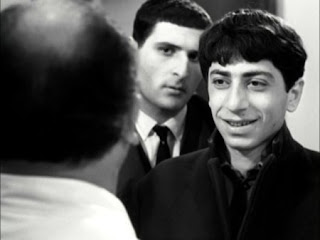no time for principles
by Douglas Messerli
Amiran Chichinadze (screenplay), Otar
Iosseliani (director) Giorgobistve (Falling Leaves) / 1966
The film then quickly transfers to the city, with a short
breakfast-table scene where a mother and father are outraged by their son, who
dresses in a black shirt rather than a white, and refuses to eat what his
mother has put upon the table. The generations here are at war. Soon after,
however, Iosselliani takes us into another home where a slightly wealthier
family lives, the walls filled with photographs of well-dressed relatives
posing, apparently, at their summer estates. Here, a young man, Nico (Ramaz
Giorgobiani) awakens his three sleeping nieces and calls into awaken his
sleeping mother and sister. In the kitchen he puts on the coffee pot and
carefully fills a bowl with water to feed the balcony plants. A peaceful
breakfast follows before he is collected by a friend, Otari (Gogi Kharabadze),
the two clearly on their way to get their passports before applying for a job.
From the very first moment forward, we recognize Otari on the rise, well
dressed and positive about his future, critical of his more slovenly and
slightly awkward friend, Nico. As they go through their applications, the
differences between the two young men become even more apparent. In the wine-making
collective where they apply for a job, Nico admits that he occasionally drinks
and gambles, that he is only an average student, while Otari is above average
and shares none of his friend's vices. He is sent to the lab, while Nico is
sent into the wine cellars.
Predictably, however, Nico gets on better with his fellow workers,
including a neighborhood girl, Marine (Marina Kartsivadze) with whom most of
the men in the plant are in love, and in only a few days, Marine, an outright
flirt who plays each of the men off against the others, has granted Nico two
meetings, while ignoring the attentions of the better dressed and suaver Otari.
The working men, moreover, have known Nico's father, and it is clear, that
despite Nico's inability to properly express himself and his general
shyness—seeming at times even to be a bit simple minded, more like a child than
a young man on the rise—that he is more beloved by all, including the impatient
head of the wine factory (Aleqsandre Omiadze).
The wine factory, meanwhile, is being reminded that they must reach their annual quota for production demanded by the Russian authorities. The workers are well aware that the cask that is scheduled for bottling is not yet up to snuff, the wine of inferior quality.
As the staff meets to sample the wine and make the decision, they, one
by one, defer to the schedule, agreeing to bottle the wine instead of giving it
more time or adding gelatin to it which might enrichen its taste. It would take
too long to properly ferment. Only Nico, now a lab assistant, refuses to sign
on, stubbornly insisting that the company keep to the high level of products it
is known for. The head of the company chastises him for his stubbornness, and
others, including Otari are furious for his inability to go along with what
seems inevitable. This is no time for principles, they argue. Even the head of
the company's young, piano-playing son, explains to Nico that he is not
thinking, that although Nico has more in common the distillery head than the
others—the company head also drinks, gambles and plays billiards—he is going
about it the wrong way.
From his idealist perspective, embedded into his thinking through the
gentle grace of his family, the contemporary world seems to have no place for
him, and little by little, his faith is worn away, his diffidence erased.
Marine once again invites him to her apartment only to make fun of him in front
of her girlfriend. The local thug again threatens him, finally blackening
Nico's eye. Attempting to turn to his working friends, he finds them all out
with their families for the weekend. For the first time, Nico at home reveals
his anger, reverberating across his nieces' faces and the gentle passivity of
his mother.
The next day at work, the cask is scheduled to be emptied into bottles,
but before anyone can begin the process, Nico orders the workers to infuse it
with gelatin. The plant managers, discovering what he has done, are outranged,
Otari on the attack. Their jobs have been jeopardized. Called into the factory
head's office, they wait to hear of Nico's firing. Yet suddenly, the plant head
orders the others out, while quietly praising Nico for his acts. Although
clearly he nor anyone at the plant would dare to disobey Moscow, Nico, through
his committed individualism, has sustained the plant's reputation. Marine is
seen pouting in the background, as the shy young man now refuses to talk with
her. Despite his aspirations, Otari is the failure in this business, a stooge
willing to betray his own county for personal success.
Although the film is somewhat simplistic in its thematic, the excellent
direction and acting of its characters helped Iosseliani's film win the
FIPRESCI prize at the 1976 Cannes Film Festival, and its black-and-white images
remain memorable.
Los Angeles, July 15, 2012
Reprinted from International Cinema Review (July 2012).






No comments:
Post a Comment